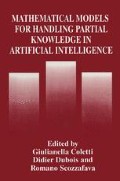Extended Abstract
Assumption based reasoning combined with an assignment of probabilities to the assumptions is demonstrated as an implementation of the theory of hints, (Kohlas, Monney, 1993) an extension of Shafer’s mathematical theory of evidence. It is one possibility among others to deal with uncertain knowledge in AI systems. The symbolic representation of uncertain knowledge allows to apply classical inference techniques.
Research supported by grants of ESPRIT Basic Research Activity Project DRUMSII (Defeasible Reasoning and Uncertainty Management).
Access this chapter
Tax calculation will be finalised at checkout
Purchases are for personal use only
References
de Kleer, J. 1986. Problem Solving with the ATMS. Artificial Intelligence, Elsevier Science Publisher B. V. (Amsterdam), 28, 197–224.
Genesereth, M.R., & Nilsson, N.J. 1987. Logical Foundations of Artificial Intelligence. Morgan Kaufmann Publishers.
Gödel, K. 1930. Die Vollständigkeit der Axiome des Logischen Funktionenkalküls. Monatshefte für Mathematik und Physik, 37, 349–360.
Hänni, U. 1993. Fast Generation of Supports with an Incremental Resolution based Inference Algorithm. Tech. Rep. Inst. for Informatics, University of Fribourg.
Inoue, K. 1992. Linear resolution for consequence finding. Artificial Intelligence, Elsevier Science Publisher B. V. (Amsterdam), 56, 301–353.
Kohlas, J., & Monney, P.A. 1993. Probabilistic Assumption-Based Reasoning. In: Heckermann, & Mamdani (eds), Proc. 9th Conf. on Uncertainty in Artificial Intelligence. Kaufmann, Morgan Publ.
Lauritzen, S.L., & Spiegelhalter, D.J. 1988. Local Computations with Probabilities on Graphical Structures and their Application to Expert Systems. J. R. Statist. Soc. B, 50 (2), 157–224.
Reiter, R., & de Kleer, J. 1987. Foundations of Assumption-based Truth Maintenance Systems. Proc. Amer. Assoc. A.I., 183–188.
Siegel, P. 1987. Représentation et Utilisation de la Connaissance en Calcul Propositionel. Ph.D. thesis, Université d’Aix-Marseille I I. Luminy, France.
Author information
Authors and Affiliations
Editor information
Editors and Affiliations
Rights and permissions
Copyright information
© 1995 Springer Science+Business Media New York
About this chapter
Cite this chapter
Hänni, U. (1995). Computing Symbolic Support Functions by Classical Theorem-Proving Techniques. In: Coletti, G., Dubois, D., Scozzafava, R. (eds) Mathematical Models for Handling Partial Knowledge in Artificial Intelligence. Springer, Boston, MA. https://doi.org/10.1007/978-1-4899-1424-8_17
Download citation
DOI: https://doi.org/10.1007/978-1-4899-1424-8_17
Publisher Name: Springer, Boston, MA
Print ISBN: 978-1-4899-1426-2
Online ISBN: 978-1-4899-1424-8
eBook Packages: Springer Book Archive

